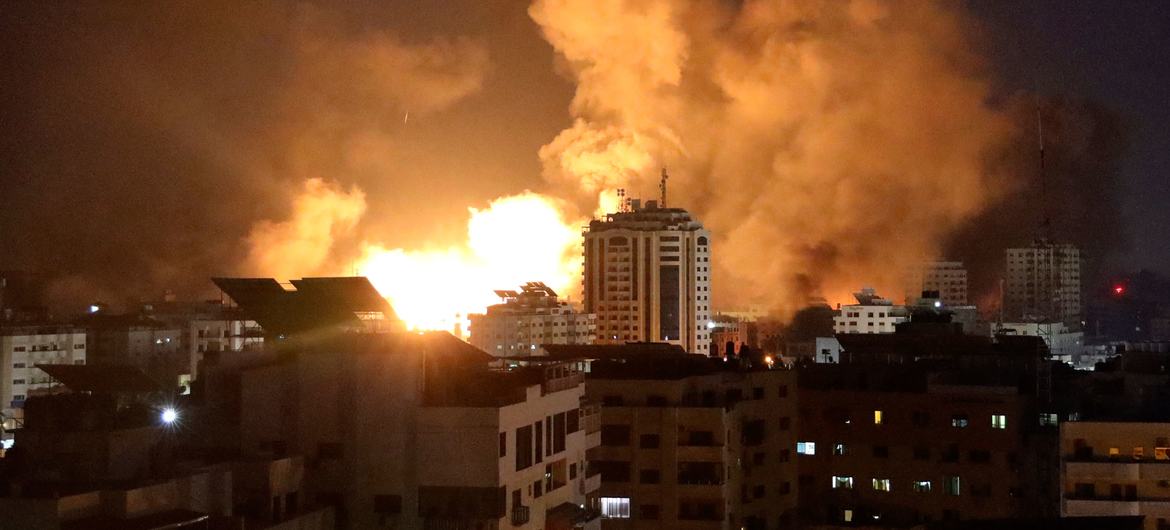
Explainer: What now, as Security Council deadlocks on Gaza?
© UNICEF/Eyad El Baba | Missile attacks on Gaza are continuing (file).
United Nations, 19 October 2023
Conflict is raging, threatening to spill over multiple borders and the world’s only body charged with maintaining international peace and security can’t agree on a solution. Now what?
The latest upsurge in violence between Israel and Hamas which began on 7 October swiftly reached the radar of the UN Security Council, tasked by the UN Charter with maintaining international peace and security.
But, to date, the 15-member organ has rejected similarly worded draft resolutions aimed at, among other things, establishing a ceasefire and a humanitarian corridor for besieged Palestinians.
Here’s what you need to know about what happens next:
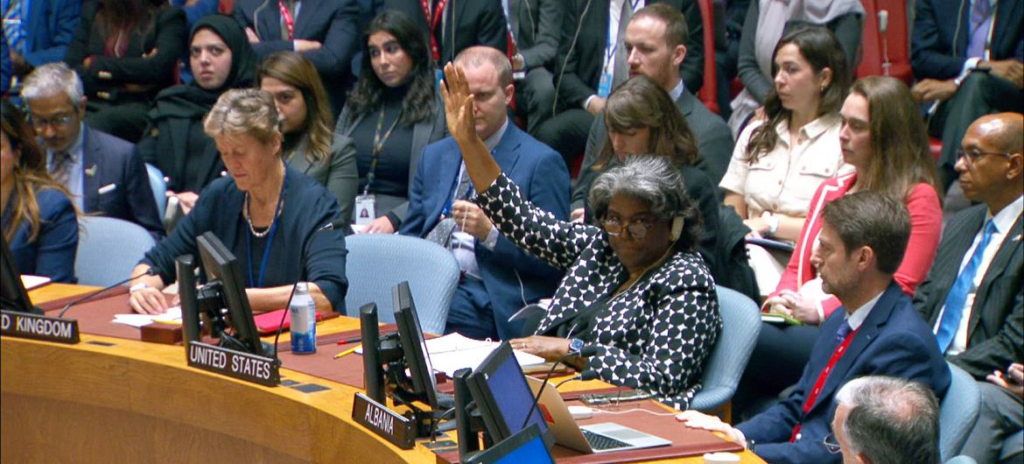
Screenshot | US vetoes the Brazilian-led draft resolution on the Israel-Gaza crisis.
What follows a ‘veto’ ?
What’s a veto, who wields it, and why does it matter in times of crisis? At the Council’s inception in the shadows of the Second World War, “veto” power, though not explicitly mentioned in the Charter, was granted to its five permanent members (China, France, Russia, United Kingdom, and the United States) because of their key roles establishing the UN.
Despite decades-long efforts to reform the Council, the veto remains in the hands of the Council’s permanent members, colloquially known as the “P5”.
So, when any of the P5 vote “no” in the Council, they invoke this power. That’s what happened on 18 October, when the US vetoed a new Brazilian proposal.
Going forward, Council members may resolve their differences and table a new draft for a vote or call on the wider UN membership – the 193 Member States that make up the General Assembly.

UN Photo/Manuel Elías
Vetoing the veto
At the same time, UN Member States can request the Assembly President to convene to scrutinize the recent Council veto, as it did in early September.
That’s thanks to the world body’s unanimous adoption of a resolution deciding to hold the P5 accountable for using their veto power, a move triggered by Russia’s full-scale invasion of Ukraine in early 2022 and subsequent Security Council deadlock on that situation.
At the request of Member States, the Assembly President can convene a formal meeting within 10 working days of the casting of a veto by one or more permanent Council members. In the case of the US veto that stopped a resolution on the current Israel-Palestine conflict, the deadline for a hearing in the Assembly would be 1 November.
Member States can also request the General Assembly President to convene a debate on the situation as to which the veto was cast, provided that the world body does not meet in a rarely called emergency special session on the same issue.
The end goal would be for UN Member States to make recommendations, including the possible use of armed force, to maintain or restore peace and security on the ground.
All General Assembly resolutions have great moral and political weight due to the universality of its membership, but are non-binding and do not carry the force of international law as do some measures agreed on in the Security Council.
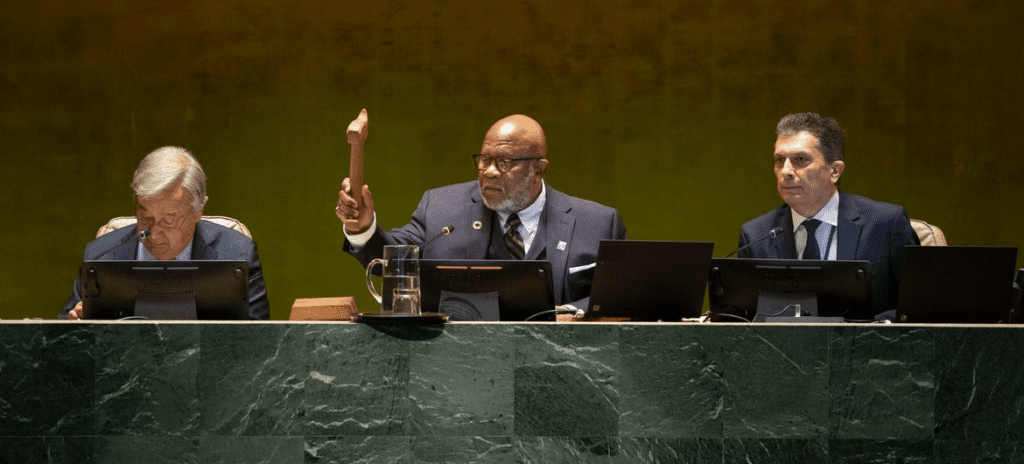
UN Photo/Cia Pak | Dennis Francis (centre), President of the 78th session of the United Nations General Assembly, chairs the opening of the General Debate.
Emergency special sessions
As the situation in the Middle East escalates, finding a global consensus is not easy. But urgent global discussions can result in collective action. In the case of ongoing conflict, such action can include helping to stop the bloodshed, establishing a ceasefire, and easing civilian suffering on the ground.
Given the daily rising daily death toll amid the ongoing conflict, if requested to do so by the Security Council on the vote of any seven of its members, or by a majority of the entire UN membership, the General Assembly President must convene within 24 hours an emergency special session.
Once convened, under a landmark 1950 resolution widely known as ‘Uniting for peace’, the UN’s entire membership would consider the matter immediately with a view to making appropriate recommendations for collective measures. In the case of a breach of the peace or act of aggression, that includes the use of armed force, when necessary, to maintain or restore international peace and security.
That could mean a swift cessation of hostilities, an end to the siege on Gaza, and a step towards a lasting peace for Israelis and Palestinians.
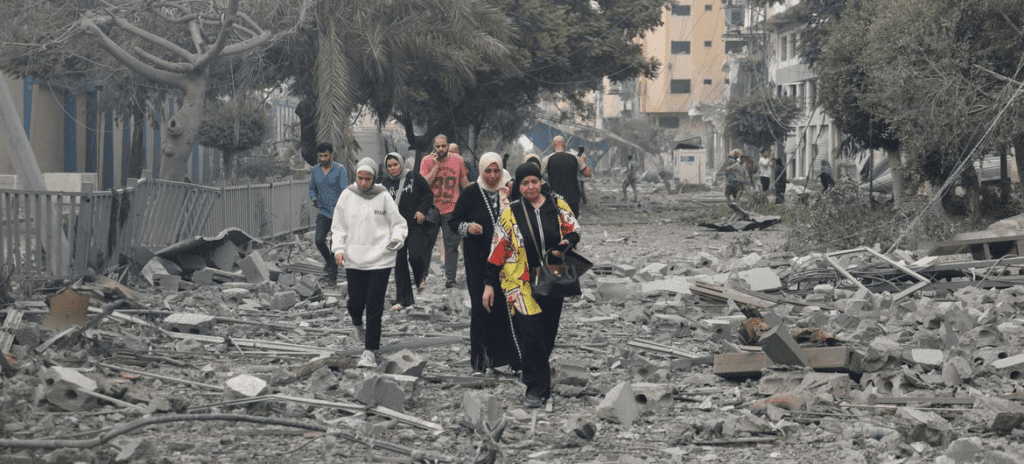
© UNICEF/Eyad El Baba | Families flee their shattered neighbourhood, Tal al-Hawa, to seek refuge in the southern Gaza strip.
Uniting for peace
As the world’s conference room, the UN is driven by the decisions of its Member countries. Only 11 emergency special sessions of the General Assembly have been convened since 1945, five pertaining to the Middle East. A new session would come only one year after its predecessor.
The eleventh emergency special session was convened in late February 2022, six days after Russia’s full-scale invasion of Ukraine.
Prior to that, the tenth such session pertained to “illegal Israeli actions in occupied East Jerusalem and the rest of the Occupied Palestinian Territory”, which may be resumed by the Assembly President at the request of Member States.
The first emergency special session opened at UN Headquarters on 1 November 1956, focusing on the Middle East, including some of the issues currently facing a deadlocked Security Council.
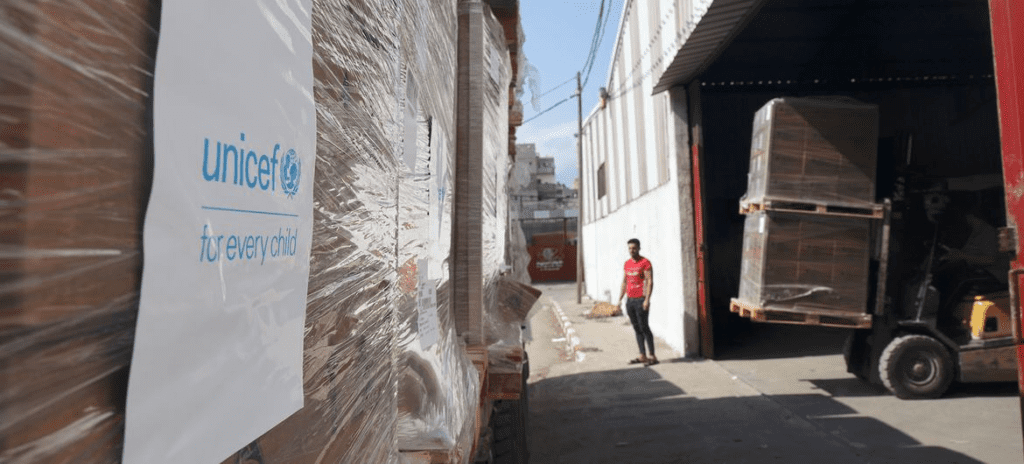
© UNICEF/Mohammad Ajjour | Medical supplies which were already in Gaza are being distributed by UNICEF.
Does Council inaction mean the UN’s hands are tied?
No.
While the Security Council continues to consider the current situation in the Middle East, UN diplomatic and humanitarian efforts have been fully mobilized since the conflict’s outbreak, including the UN Secretary-General’s good offices.
As the Secretary-General and his top political and humanitarian envoys have headed to the region, UN agencies have been scrambling around the clock to help besieged Palestinians in Gaza and the occupied West Bank since the conflict began and even before. The UN relief agency for Palestine refugees, UNRWA, has been operating in the region since 1950.
Meanwhile, UN Member States continue to discuss the best way forward to end the conflict.
Even though the system of maintaining international peace and security is not perfect, the UN is the only global forum to discuss life and death issues and decide on a path towards peace.
At the end of the day, the UN Member States themselves drive the process from the world’s only truly global meeting place – UN Headquarters.
The original article appeared here.